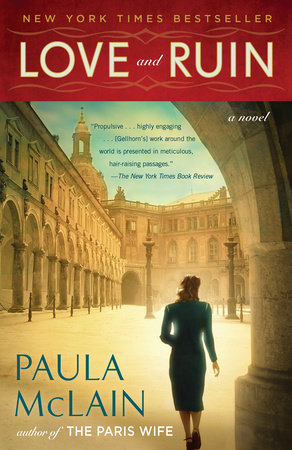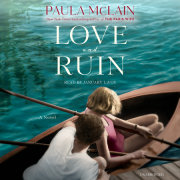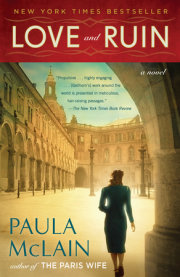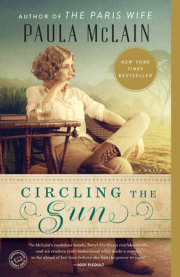Near dawn on July 13, 1936, as three assassins scaled a high garden wall in Tenerife hoping to catch the band of armed guards unaware, I was asleep in a tiny room in Stuttgart, waiting for my life to begin.
The killers were professionals. They moved without sound, slinking up hidden ropes, never looking at one another or thinking of anything but the next moment’s action. On cat’s feet, they fell from the wall to the ground, passing invisibly through the shadows and creeping softly toward their target.
It was like a symphony unfolding. Their plan was to take the guards one by one by slitting their throats. Then they would force the door beyond the veranda and climb the marble steps to the little girl’s room. María del Carmen, she was called, ten years old and sweetly sleeping until a rope would gag her quickly and pillows would crush over her small face. Then to the master bedroom, where they would dispatch the last few guards. Everything would be done without firing a single shot. The general and his beautiful wife wouldn’t need to stir even a little in their bed beyond the door, their bodies still as a painting by Velázquez, until death came.
All of this had been set in motion, but then one of the guards turned suddenly and machine-gun fire cut the night. The assassins scattered, barely escaping with their lives. The general woke at the sound of gunfire, but after hearing from his men what had happened, he only stumbled back to bed. Attempts on his life were not rare and particularly not just then, when he was on the cusp of the thing he’d waited for, as a tiger waits, just out of sight.
Five days later, the planned uprising in Morocco began. The general broadcast a message urging all military officers to join the insurgence and overthrow the Spanish government. Then he sent his wife and daughter into hiding in France, and was taken through the streets of Tenerife, where already the shooting had begun, to a waiting de Havilland Dragon Rapide. He wore civilian clothes and dark glasses and, by way of further disguise, had shaved off his familiar mustache.
It was nothing after all this for the trim little plane to take flight, ferrying its passenger to North Africa, where he would prepare the army that would soon overtake mainland Spain. On the way, he donned his uniform, crisp khaki with a red-and-gold belted sash. And just like that, he became General Francisco Franco, newly escaped from exile. Ready to start a war the whole world would be forced to finish.
And what was I doing then, at twenty-seven, when Franco made his play for Spain? Standing in a deepening shadow, as everyone was, whether they realized it or not.
German troops had recently marched into the Rhineland, and the Nuremberg Laws were being enforced, banning Jews from marrying or bearing children with “pure” Reich citizens, restricting them from public schools and certain businesses, and essentially branding them, along with Afro-Germans and Gypsies, enemies of the
Volksgemeinschaft, so the Nazis could protect their Aryan blood in a race-based state. It was all so shocking and so absolutely wrong. And yet you could almost pretend it wasn’t happening by going on with your life and thinking it had nothing to do with you.
I had lived in Paris on and off for years, trying to be a writer and also falling in love a lot, without being terribly successful at either. I was dying to write a character as glittering and sharp as Lady Brett from
The Sun Also Rises, but since I couldn’t, I would settle for trying to be her. I wore long skirts with knit sweaters and sat in cafés smoking too much and crinkling my eyes and saying, “Hello, darling,” to near strangers. I ordered cocktails that were far too strong for me, and laughed at things that were desperate, and threw myself hard at experience, by which I mean married men. But the worst of it was walking home alone afterward under a smeary purple sky feeling not at all like Lady Brett but sad and lonely and thoroughly confused about what to do and who to be.
Something was missing in my life—in me—and I thought writing could fill it or fix it, or cure me of myself. It was only a notion I had, but I’d been following it faithfully, from St. Louis to New York, New York to Paris, Paris to Cannes, to Capri, and now to Stuttgart, where I meant to do research. I’d recently begun a novel about a young French couple that would do bold and important things in the name of political pacifism—go on strike with coal miners and endure the metal truncheons of the gendarmes, all in the name of social justice.
The story felt brave and serious to me when I was hunched over my notebooks in the Weltkriegsbibliothek, but there was a moment every day when I stepped out of the library and was confronted with the actual world. How naïve and hopeless the idea of pacifism seemed when the streets were full of brownshirts.
One day I was at the cinema when two Reich soldiers came through and dragged a young Jewish woman out of her seat in front of me and into the street by the back of her neck like a dog. The lights came down and the film reel began to spin, but I couldn’t be still in my chair and be entertained, not now. Walking back to my pension, I startled several times as I caught my reflection in a shopwindow. I looked Aryan enough, with my blond waves and light blue eyes and strong straight nose. I’d inherited my features from my parents, after all, who had easily passed as Protestant in anti-Semitic St. Louis. But there was Jewish blood in my family on both sides.
From Stuttgart, I moved on to Munich, where things grew even darker and more ominous. I read about Franco’s coup in Nazi newspapers, which recounted everything in a boasting, sneering way. The rapidly falling Republican regime was described as a pack of “Red Swine Dogs,” while Franco glowed, a prince of the Spanish people. Never mind that the government he and his henchmen were overthrowing was the product of the first democratic election in sixty years. Never mind that innocent people were being butchered so that a few could claim power and total dominion.
By the time I was back in Paris, Franco had declared martial law and vowed to “unite” Spain again at any cost, even if it meant slaughtering half the population. Most of Spain’s military had joined the Nationalists, while untrained civilians struggled to defend cities and villages. Pamplona, Ávila, Saragossa, Teruel, Segovia, and the whole of Navarre fell like dominoes before a month had passed. Anyone who spoke against the coup was a target. In the old Moorish city of Badajoz, the Nationalists marched almost two thousand into the Plaza de Toros—militiamen and peasant farmers, women and children—and opened fire with machine guns, leaving the bodies where they fell, and then pushing on to Toledo, where they would do the same.
Worse still were the terrible alliances being formed. Nazi Germany sent state-of-the-art Luftwaffe bomber planes and three thousand troops to Spain in exchange for mineral resources, raw copper and iron ore that would soon help Hitler with his own deadly goals. Submarines were sent and more bombers, hundreds of shiploads of supplies and skilled officers to train Franco’s men and sharpen their ability to kill and torture.
Mussolini came to Franco’s aid as well, “loaning” him eighty thousand troops and forming the third deadly prong of the Fascist triangle. And just like that, after years of sinister plotting, and almost overnight, Europe was a different place, and a more threatening one. It seemed anything could happen.
Stalin in the Soviet Union had his own agenda, but for the moment there was much to be gained by aiding Republican Spain. He waited to be joined by the major democracies in the West with arms to sell, but France’s government was bitterly divided, and Britain seemed more concerned with the salacious happenings between King Edward VIII and Wallis Simpson. In the States, Roosevelt was busy trying to manage the crippling effects of the Depression and also in the throes of his reelection campaign. And after all, there was much for America to debate in regard to Spain’s pleas for help. There were troubling rumors of arms being given to anarchists and labor-union militias if they would join the Republic’s cause—a difficult stance to support when there was already so much fear at home about communism.
Roosevelt decided on a blanket arms embargo, vowing to keep America out of foreign wars as long as possible. But for some of us who watched the shadows deepen all through that fall of 1936, there was no such thing as a foreign war. Nationalist forces spread through innocent villages, killing tens of thousands as they went. As they shelled the capital of Madrid, surrounding it on three sides, we felt responsible. The Republic of Spain had tried for democracy only to be slashed down and tortured. Why was it not our concern?
Slowly, slowly, and then all at once, thousands of people began to come forward as volunteers. International Brigades were formed out of troops from France and America, Canada, Australia, Mexico. Most of the men weren’t trained soldiers. Most, in fact, had never held a gun, and yet they grabbed what weapons they could—revolvers their fathers had left them, hunting guns, pistols, gas masks from the hardware store—and boarded trains, ships, cargo planes.
It was a beautiful crusade, and though I wasn’t immediately sure how I would find a role for myself, later I thought only this:
It may be the luckiest and purest thing of all to see time sharpen to a single point. To feel the world rise up and shake you hard, insisting that you rise, too, somehow. Some way. That you come awake and stretch, painfully. That you change, completely and irrevocably—with whatever means are at your disposal—into the person you were always meant to be.
For me the war in Spain will always shine with the light of hard-won transformation. It was like falling in love. Or looking up into the sky to see a burning arrow, which screamed to be followed. It was that simple and complicated all at once. And if more would be set in motion than I could possibly predict or even imagine, I was still ready to say yes. And if I would soon lose my heart forever, never to retrieve it, lose absolutely everything—I was ready for that, too. My life seemed to be demanding it. It was calling me forward. There wasn’t any choice to be made, in the end. I would have to go to it, with my eyes wide open, and my hands open, too, willing to pay the price.
Copyright © 2018 by Paula McLain. All rights reserved. No part of this excerpt may be reproduced or reprinted without permission in writing from the publisher.











